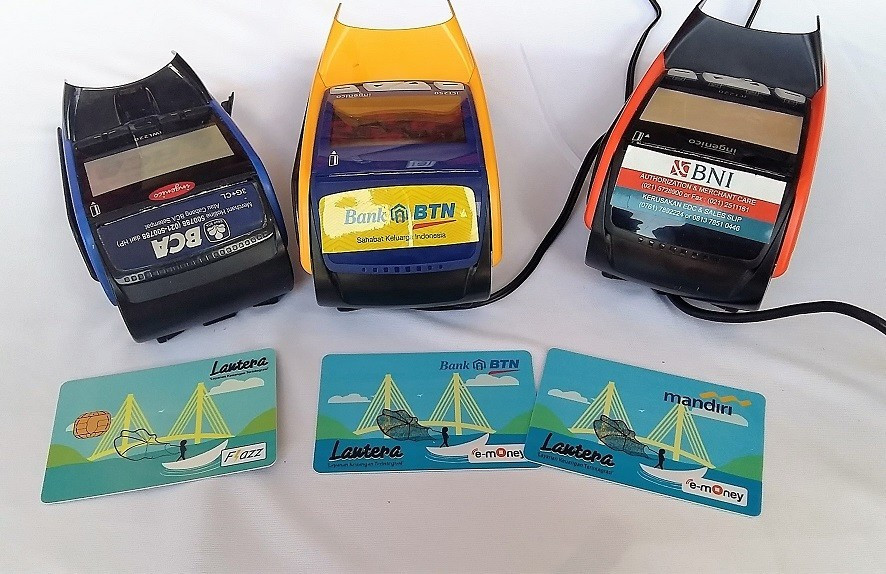News
BRI graft case: Another layer of governance failure in SOEs
Tenggara Strategics July 22, 2025 Electronic data capture (EDC) devices of three banks. (JP/Anton Hermansyah)
Electronic data capture (EDC) devices of three banks. (JP/Anton Hermansyah)
The Corruption Eradication Commission (KPK) has uncovered a large-scale corruption case involving Bank Rakyat Indonesia (BRI), one of the country’s largest state-owned lenders. The scandal, estimated to involve hundreds of billions of rupiah, pertains to the procurement of electronic data capture (EDC) machines and implicates several former BRI executives. The case not only raises concerns about accountability within state-owned enterprises (SOEs) but also threatens to erode public trust in the financial sector, where SOEs play a dominant role.
The KPK has named five suspects in the case, including three former BRI executives: former deputy president director Catur Budi Hartono; former digital, information technology (IT) and operations director Indra Utoyo, who was most recently president director at private lender Allo Bank Indonesia (Allobank); and former senior executive vice president for asset management and procurement Dedi Sunardi. The remaining two are executives at EDC vendors: president director Elvizar of payment solution company PT Pasifik Cipta Solusi (PCS) and president director Rudy S. Kartadidjaja of PT Bringin Inti Teknologi (BTI), BRI’s IT solutions subsidiary.
BRI purchased 346,838 units of BRIlink Android EDC machines for Rp 942.74 billion (US$57.75 million) between 2020 and 2024, as well as 200,067 EDC machines through a fully managed service (FMS) leasing contract, under which vendors are responsible for bearing operational risks. However, the bank overspent its FMS budget of Rp 581.79 billion, and by 2024 had paid Rp 634.2 billion for an extended contract through to 2026. BRI’s total payments for the EDC procurement project reached Rp 2.2 trillion by 2024.
The KPK suspects the EDC procurement was manipulated from its outset. In 2019, Indra allegedly ordered that only Sunmi (via PCS) and Verifone (via BTI) undergo proof of concept compatibility (POCC) testing, effectively sidelining other potential vendors. The pricing was allegedly based on input from preselected vendors due to win the contracts. The corruption involved lavish bribes disguised as gifts. PCS director Elvizar allegedly gave Catur Rp 525 million in the form of a bicycle and two horses and “gifted” Dedi a Rp 60 million Cannondale bicycle. Verifone Indonesia executives Irni Palar and Teddy Riyanto are also suspected of bribing Rudy with a staggering Rp 19.72 billion to secure the contracts.
The suspects have been charged under Articles 2(1), 3 and 18 of Law No. 20/2001 on Corruption Eradication as an amendment to Law No. 31/1999, in conjunction with Article 55(1) of the Criminal Code (KUHP). Using the real cost method, the KPK has estimated that the corruption case incurred Rp 744.54 billion in state losses. As part of state asset recovery, the KPK has seized Rp 43.3 billion from the suspects, including Rp 5.3 billion in cash, Rp 28 billion from their time deposit accounts and Rp 10 billion from their bank accounts.
The corruption scandal surrounding BRI is yet another strike against the reputation of banking SOEs, following recently uncovered corruption and fraud that impacted several regional development banks (BPD). The most recent bribery case implicated former chief commissioner Iwan Setiawan Lukminto of now-bankrupt Sri Rejeki Isman (Sritex), who received Rp 539.88 billion and Rp 149 billion in non-collateral loans from the West Java and Banten regional development bank (BJB) and Bank DKI, respectively.
The BRI graft case adds to growing concern over governance failures in the state-owned banking sector. Coming on the heels of similar scandals BPDs, it underscores systemic weaknesses in oversight, transparency and procurement integrity across SOEs. On top of the negative effects on BRI’s business prospects due to reputational damage, the case presents an obstacle for the Daya Anagata Nusantara (Danantara) Investment Management Agency as the parent entity of most SOEs. As the sovereign wealth fund seeks to position itself as a trustworthy partner to global investors, recurring governance lapses are likely to raise a red flag over internal controls, audit effectiveness and fraud risk management, ultimately dampening investor confidence in the country’s SOEs ecosystem.
What we've heard
Several sources at the State-Owned Enterprises (SOE) Ministry have revealed that BRI’s EDC procurement project aimed to boost fee-based income from financial services outside of traditional banks, including by accommodating the growing use of QRIS for retail transactions.

